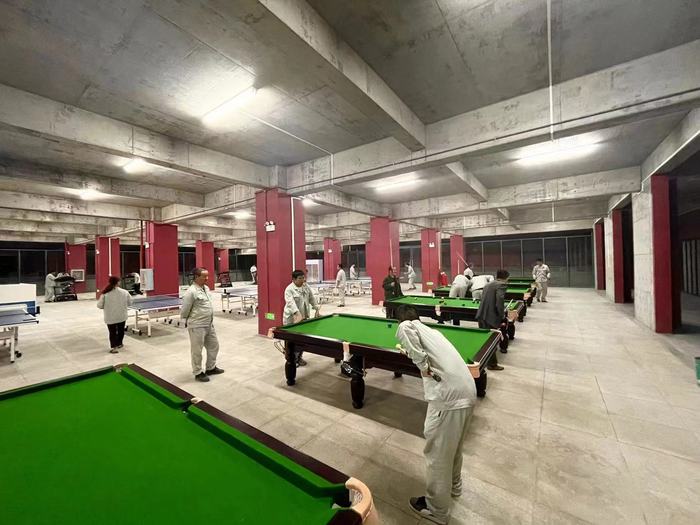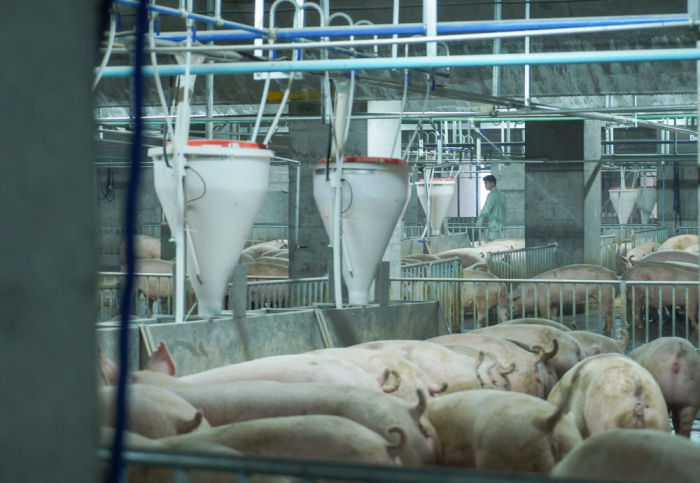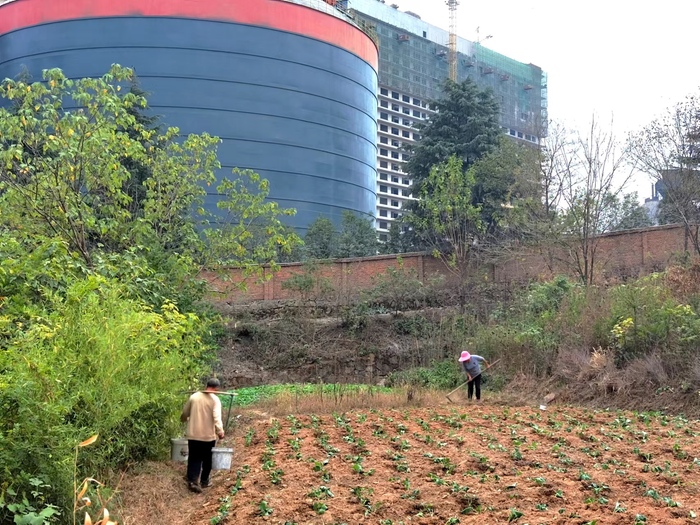The biggest, tallest pig farm in China will produce 600,000 pigs a year when at full capacity.

An aerial view of Zhongxinkaiwei's 26-story pig farm in Ezhou, Hubei Province.
By LU Yaxuan
At the end of September, 17 temperature-controlled trucks leave Shaoguan in Guangdong Province carrying 3,700 breeding pigs, bound for Ezhou in Hubei, 800 kilometers to the north.
On arrival, the trucks dock at an ominous cement building, looming above quarries and factories on the outskirts of the bleak industrial city.
After three rounds of disinfection, the pigs trot on to cargo elevators. There is no need to fly. Each lift carries on about 60 porkers up to their penthouse pigsties, which occupy the third to the seventh floors of the 26-story building.
The shiny new pig farm is owned by Zhongxinkaiwei Modern Farming. It’s arguably the biggest, and definitely, the tallest, pig farm in China and it will produce 600,000 pigs a year when at full capacity.
SUN Kaineng, 30, quit his job as general manager at a neighboring pig farm much closer to the ground, and became a senior technician here. He says Zhongxinkaiwei’s scale is its most staggering feature. Sun has a degree in veterinary science and makes 20,000 yuan (US$2,800) a month now.
“There are many college graduates here. They studied everything from automation to medicine,” he said. Junior workers with associate degrees are paid 10,000 yuan a month, almost twice the average salary in Ezhou.
The pigsties are a closed environment to prevent transmission of disease, a common practice at pig farms. Workers stay on site for as long as two months at a time to minimize contact with the outside world. Before each shift, they must shower and test for pathogens. Upon entering the pigsties, they take another shower and are heat dried in a 65-degree-Celcius room, before showering one more time (a nozzle automatically squirts shampoo on their heads so that they don’t skip hair washing). Environmental and operational data is collected all round the building, then aggregated and analyzed in a 20-million-yuan centralized bio-control system.
Sun’s job is to monitor the temperature, humidity and air quality, and take action if needed. Like his colleagues, he lives at work and is used to the lifestyle – the longest stretch in his previous job was five months. When off shift, he entertains himself by going to the gym and playing billiards, which can also be found in the 26-story building. Starting this month, Zhixinkaiwei allows employees to go home once a week.

ZHUGE Wenda, the owner of the farm, made his money in cement. He took over a state-owned factory in Ezhou in 2003, right at the beginning of mass infrastructure building and the real estate boom. Demand has cooled – cement production was down 15 percent in the first half of this year – as a result of the real estate crunch and new environmental rules. Zhuge downsized his cement factory and started the piggery in 2020.
He chose pigs because, while China is the largest pork consumer in the world, “there isn’t much tasty pork out there.” But traditional farms are bad at production and terrible for the environment.
“Pig farms are heavy polluters. Technologically advanced farms will eventually replace traditional ones by being efficient and sustainable,” he said.
A manager at Zhuge’s cement factory said his boss is “obsessed with technology.” Zhixinkaiwei already holds ten patents in ventilation, wastewater treatment, and animal feed shipping. The building cost 2 billion yuan, most of which was spent on waste treatment and energy saving. Dorms are equipped with power-efficient heating, ventilation, and air conditioning. Residual heat from the cement factory is reused by the pig farm so that the pigs can “drink warm water, take hot showers, and live in rooms with under-floor heating.” Warm drinking water provides each pig with an extra 150 calories per day, saving 20 billion yuan on feed over a year.
“The pork market is extremely competitive. We can’t control prices, but we can control costs,” said Zhuge.
Up to 80 percent of pig farms in China are small, family-owned operations, both perpetrators and victims of cyclic market swings. Prices are now forecast to drop due to oversupply, and Zhongxinkaiwei is braced for a hit. When asked about turning a profit and making back the 2 billion yuan he has spent, Zhuge brushed it aside, because “people will always eat pork.”
“I don’t have to worry about sales. It’s all about costs, and I have cost advantages over my competitors. It’s OK if I don’t make money tomorrow or next year. Eventually, I will,” he said.
Longtermism is Zhuge’s favorite term. It pops up in his writing and is even mentioned in Zhongxinkaiwei’s mission statement.
“It means refraining from expanding too fast at the peak of the market, and moving ahead steadily when everyone retreats,” he wrote in a recent article, recalling his own experiences in cement production. Zhongxinkaiwei’s job, he tells his workers, is to raise pigs, not to obsess over price fluctuations.

Unlike small farmers, Zhuge can talk on and on about longtermism simply because he can afford to. Zhongxinkaiwei has no debt. The cement factory supplied both the money and the cement for the new building.
Limestone mining and cement manufacturing dominate the Ezhou economy. The city was the site of China’s first cement factory in 1907, and by the 1990s, almost every family had someone working either at a quarry or a cement factory. Today, heavy pollution is in plain sight. Abandoned mines have left gaping craters on bare hills. Some areas are uninhabitable and whole villages had to be relocated.
The local government is keen to find new sources of jobs and tax revenue. Villagers, who were initially concerned about the stink from a pig farm, were invited to tour the new building before operations started. If anyone is still unconvinced, there is the job bulletin. Hiring prioritizes locals, who are offered 7,000 a month even if they are unskilled.

Zhongxinkaiwei plans to open another factory making pig feed, followed by a slaughterhouse and pork trading company. For Zhuge's towering piggery, the sky really is the limit.